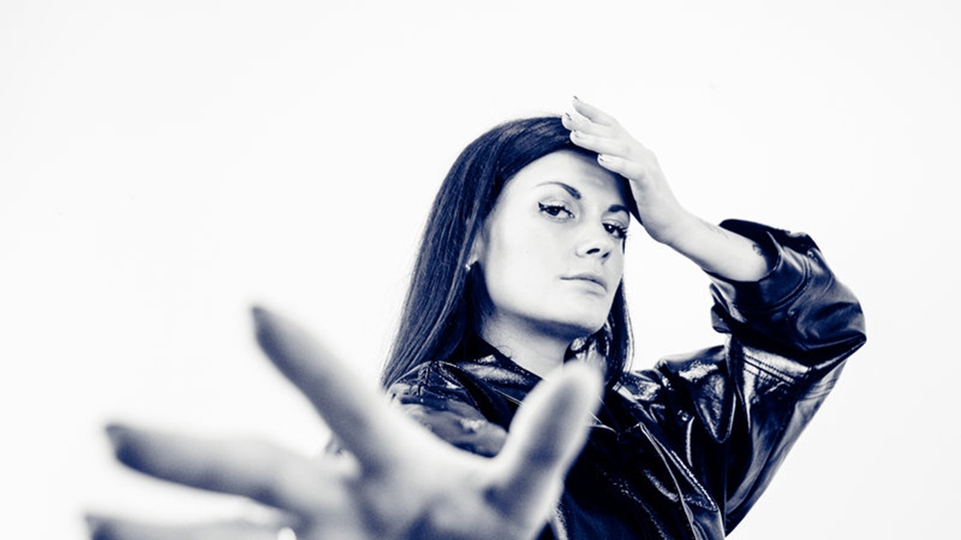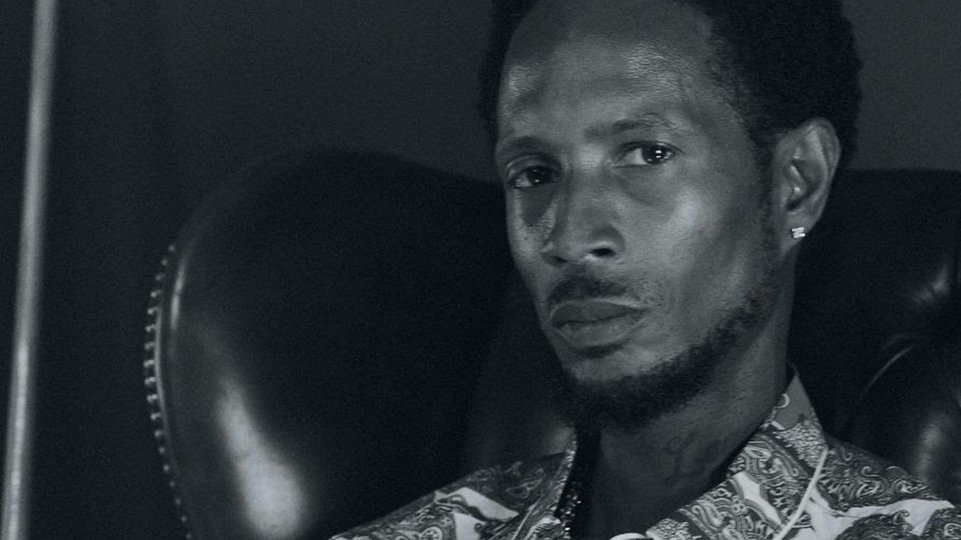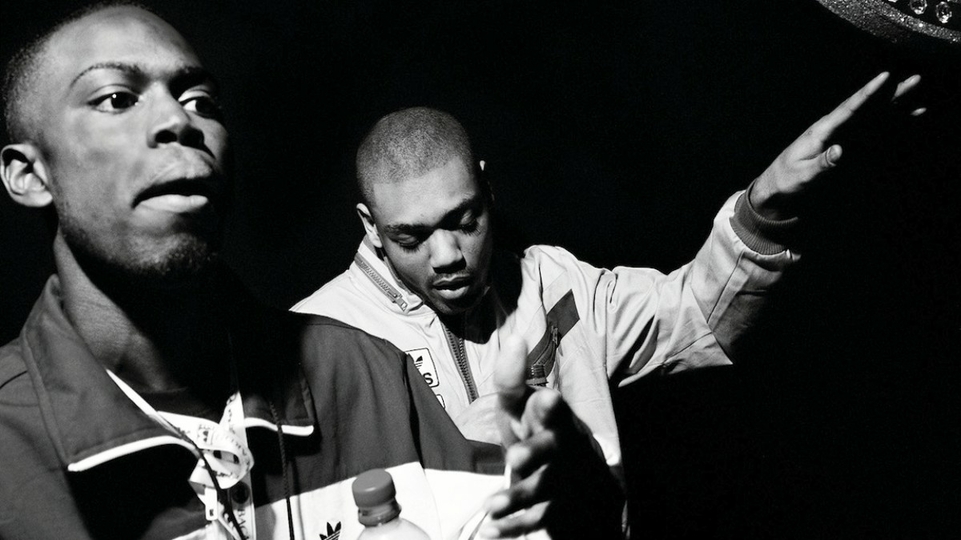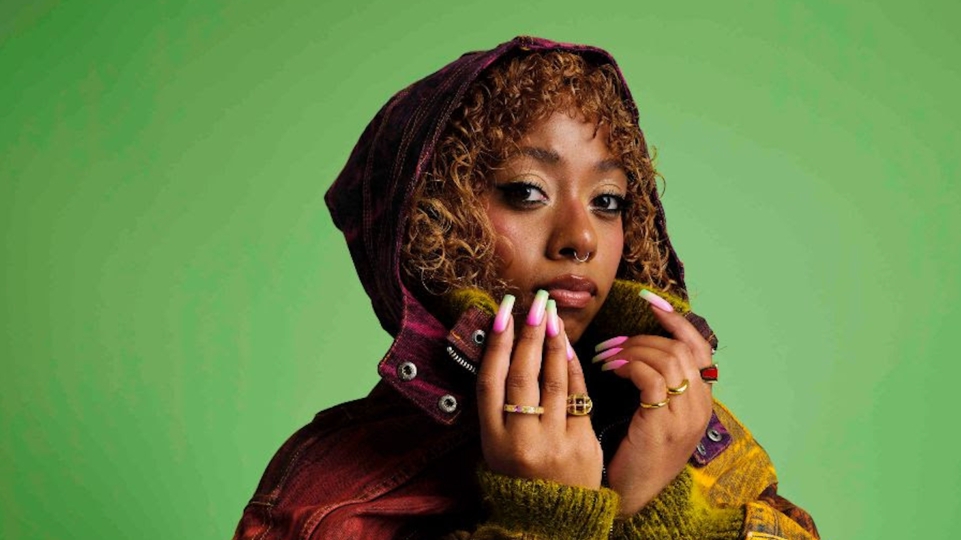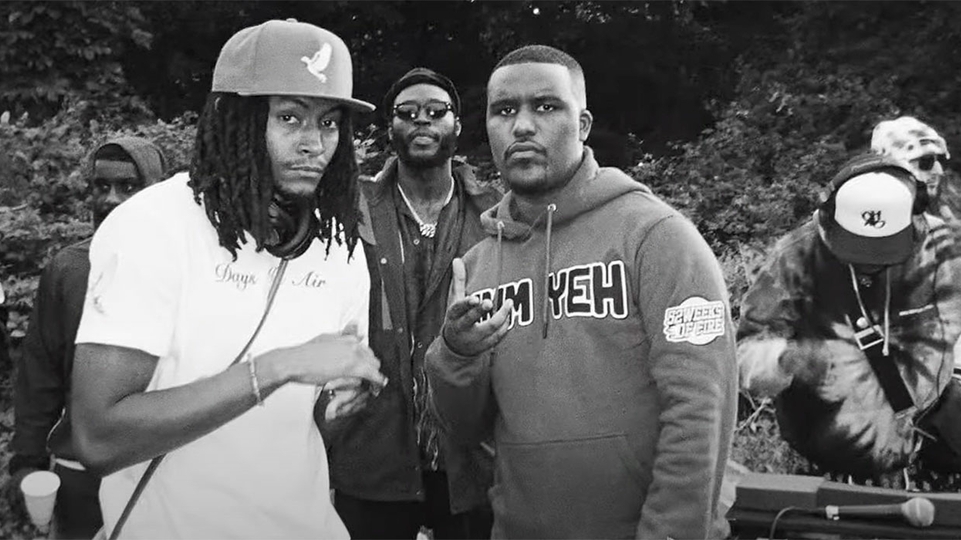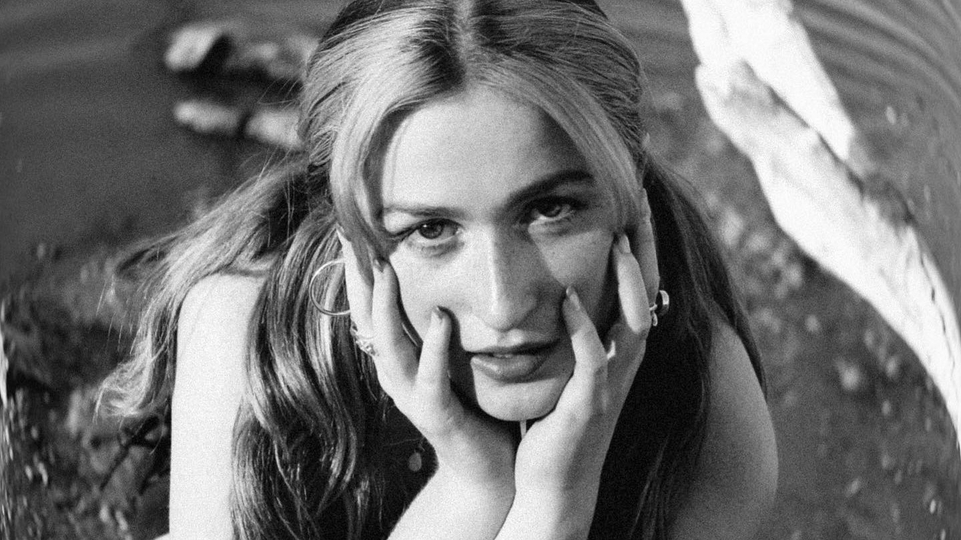
Mall Grab is ready for the next level
On his debut album, 'What I Breathe', Aussie-born, London-based DJ and producer Mall Grab marks a new creative chapter in his journey, far from the lo-fi house sound that shot him into the spotlight in 2015. Filled with grime and jungle influences, tracks featuring Novelist, D Double E, Nia Archives and Turnstile's Brendan Yates, as well as his own vocals, it's his most ambitious work to date. Here, Kristan Caryl chats to him about ADHD, being an outsider, dogs, style, hardcore and more
In 2017, Jordon Alexander very quickly went from little-known hopeful to top-tier house star. “When I got all that clout it does fuck up how you think of things,” he says, looking back with a slight sense of embarrassment. “It warps your view on the world. I was young. Pretty stupid. Just a little dumb c*nt thrust into a certain position and out to make a point.”
Five years later, there is no shred of ego about him. He talks sensitively and sensibly. At 28, he seems comfortable with who he is, and where he’s at. And he should be, with an accomplished debut album out now, a full schedule of bookings and a strong community of artists he is proud to support on his Steel City Dance Discs label. But there have been some bumps along the way.
One of them was partying too much. He would deal with the “nervousness and insecurities” of his new-found success “with binge drinking”, which is a common but little discussed problem in the dance music industry. Eventually, “it just gets sad,” he says in his gentle Aussie lilt. “You lose your zest for life. It was almost like an identity crisis. My personality and my stage persona merged into one, so I didn’t know where Mall Grab started and Jordon ended. I realised that drinking was a catalyst in all that.”
To combat this, Jordon has gone sober for extended periods on a couple of occasions. Each time reminds him of why he got into making and playing music in the first place. He says it can be fun to play in a right old state, but that there is nothing more satisfying than playing straight-headed: “It’s an amazing experience. The conversations you have are much more meaningful. Everything is just more genuine because if there is too much partying it becomes boring. You get jaded, you lose inspiration.”

Jordon has lived with ADHD all of his life, and it’s exacerbated by drinking. If unchecked, he says, it can lead to severe personality disorders, “which I think has definitely come out in some ways in the past”. These days he gets regular therapy to help on that front. “It’s the most helpful thing that I’ve ever done. It helps me deal with things, find out what’s toxic and just bring up all the stuff I’ve repressed.”
During the pandemic, though, he again struggled “quite a lot” with drinking and partying because “there was nothing else to do”. Many musicians turned to production for a way out of lockdown loneliness, but Mall Grab found no solace in his software. Instead, inspiration left him and he found himself in a vicious cycle of trying to sit down to write, failing to come up with anything, getting frustrated and hitting the beers. “It was like when I was at school, when I would get into something for a while and it would be going well, but then I’d lose my focus and wouldn’t be able to get it back so I would just be like, ‘Fuck this, fuck everything’.”
At first, Jordon “felt like an outsider”, partly because he was Australian and didn’t know anyone in the scene, and partly because his apparent overnight success made him a target for those who saw him as competition. He initially blew up at the heart of the much-hyped but short-lived ‘lo-fi house’ sound. The truth is, as with anything from Larry Heard’s rough-edged deep house to raw Motor City techno, that dusty and DIY aesthetic was just a result of the basic software he used to make his music. At the time, he hated the term, but now enough time has passed for him to appreciate what it did for him.
“The reason it sounded like that was because I was just not as good a producer as I am today,” he smiles, as he once again tucks his classic mid-length surfer hair behind his ears. That began to change in 2018 with his ‘How The Dogs Chill, Vol.1’ EP, which, he reckons, featured “the last lo-fi house tune” alongside a showcase of newer, harder sounds that have become his signature. “It was a real learning curve,” he says. “You get to a stage where you stop caring about everyone else and just focus on the people that do support you. I wanted to learn more, to focus on making my own sound.”


The house music of Mall Grab’s first few releases on labels like 1080p was quite different to the Talking Heads records he first started DJing with as a 12-year-old. They were borrowed from his father and played on a rudimentary setup next to second-hand disco music in local bookstores. It was the fizzing electro and blog house of labels like Ed Banger in 2007 and 2008 that turned him onto contemporary club sounds, while the legendary radio stations on Grand Theft Auto: San Andreas completed the first phase of his learning.
When we speak, Jordon is wearing a Righteous Jams t-shirt with a logo stylised like the famous Def Jam Recordings label. They’re a hardcore and punk band from Boston and a nod to the other side of his music taste: at school, he played in various bands, but owing to his “not very sociable side” he says he was never really a part of any scene until he got into electronic music. Most of the bands were inspired by classic skating sounds.
He still skates today, partly as a way of exercising, but partly for the rush of nostalgia that takes him back to those early years, especially the music. “I think a huge part for people who even just played Tony Hawk Pro Skater video games was the soundtrack. I definitely got heaps of my music taste from that, and from the skating videos, especially on the punk and hardcore side of things.”
Jordon is sat in a flat he shares with his best friend — who also does all his label artwork — and the friend’s fiancee. There’s an empty clothes horse behind him, and three original pieces of art on the wall by Korean video artist Nam June Paik, pop artist Robert Rauschenberg and abstract artist Sam Francis. He started collecting a couple of years ago, firstly because he loves art, but also as a form of investment. “It’s better than buying a car,” he says. “It’s something I can look at every day and get inspiration from.”

“I just love jumping around and dancing. I go through bursts of hyperactivity so hardcore is good for that, but so is DJing. The musical stimulation is like a massage for your brain, as corny as that sounds"
The hustle and bustle of East London’s busy streets drifts in through the windows. The occasional dog bark interrupts us. “I wish it was mine. I love dogs and always had a good rapport with them,” he says, adding that he grew up around the greyhounds his uncle bred. The only other interruptions during our conversation are when Jordon’s own busy thoughts distract him mid-sentence and he loses his thread. It’s a rare sign of his ADHD, because otherwise he comes across as a pretty calm character.
“That’s only because I’m doing this interview,” he reckons. “If we were in a cafe having a coffee or whatever I’d be tapping my feet under the table, constantly looking at my phone and shit, so the ADHD is definitely a big part of my personality.” One way his ADHD comes through is in the music he makes, plays and enjoys: the punk and hardcore he grew up around is high energy and explosive. It’s angry but, to those who listen closely, emotional. “I’m big on endorphins,” he says. “I just love jumping around and dancing. I go through bursts of hyperactivity so hardcore is good for that, but so is DJing. The musical stimulation is like a massage for your brain, as corny as that sounds.”
The day we speak is the day Boris Johnson resigns as UK Prime Minister. It is announced just as we start our Zoom. “Kind of predictable, I suppose,” reckons Jordon, but he falls short of equating Boris’ last few chaotic hours with the storming of Capitol Hill in the US back in January last year. “British people are not as divisive as Americans,” he says. “They’re not as likely to take to the streets, but generally it’s become the same in Australia. Everything has grown so much more partisan.”
He has been in London five years, and by now it feels like home. He misses the “fresher produce” of Australia, as well as “the more consistent weather”, but has a community of friends from Aus that have helped him to feel settled. “We’ve kind of got our own little transplant of Australianisms in amongst the sea of British contrasts.”


His flat is in Haggerston in the London borough of Hackney, right above what is famously said to be the worst Tesco Express in the country. It gives him an interesting perspective on life in the UK. “There’s always something going on there,” he laughs. “Last night, I was watching someone who was wrongly accused of shoplifting. It was all kicking off , so it’s always good to have a sticky beak,” he says as he cranes his neck towards the window, “and listen in when you hear something going on outside.”
It was the practicalities of international travel but also London’s rich music scene that initially took him there. And a lot of his material bears the influence of what he was listening to: he loves jungle, bass, hip-hop and grime, and laments the lack of such strong scenes back in Aus.
“People grow up here with electronic music of all different types. I guess it helps how dense the population is. Whereas Australia is so spread out, there are pockets of things here and there, and now there is a great underground, but back then it was niche. And even if you did get established, there were only a few places in the country you could play, and only play them once or twice a year so you didn’t over-saturate yourself. But here, you are on the doorstep of the world and can be somewhere else, like all over Europe, literally every weekend.”
He grew up 90 minutes north of Sydney in Newcastle, an industrial harbour which is the biggest exporter of coal in the world and was once just as important for the steel industry. It also has picture perfect beaches, a bohemian surf and skate scene, and a university where Jordon started to study Psychology, but quit after a year. “I probably thought I was smarter than I was,” he jokes. “I watched American Psycho, I’d seen Charlie Kaufman movies, so yeah, I thought it would be cool, but I figured out quite quickly that it wasn’t what I wanted to do.” After dropping out, he worked a job delivering pizzas for Domino’s, which he rates. “I just drove around listening to music.”

Now fully embedded in London, he has tried to “tastefully implant” himself into the grime and garage communities he has always respected, rather than just ripping them off in a contrived fashion. On his debut album ‘What I Breathe’ for example, he has sampled a lot of recognisable breaks, but was keen to “bring new life into them”. It also has a magnificent cover featuring six of his favourite dogs, all Golden Retrievers, all hired from someone in Cornwall for a one-day shoot that he had long dreamt of and which “did wonders for my dopamine levels”.
Some of the tracks on the album date back to 2019, when he was making tunes to play a set made up exclusively of his own material at Sónar. In early lockdown, he tried to develop them but, as he has explained, that didn’t work. It was when lockdown ended and he finally began to play out again that he got somewhere and the album felt more like “a coherent project”. He credits working with guest collaborators like Novelist, D Double E, Baltimore hardcore band Turnstile’s frontman Brendan Yates and Nia Archives as “definitely being a big part of the glue that helped make those tracks into an album”.
Many artists use a long-player as a way of stretching their legs into totally new sounds. There is a pressure to do more than on a 12”, to show a different side, to prove your worth. Often that takes the form of trite ambient tracks or overly elaborate synth work. “I totally agree,” says Jordon. “Someone just holding down a key and it all feels a little bit unnecessary. I was much more leaning towards wanting to showcase all my influences and show where I’m going in the future.”


“I would always rather listen to a good banger than some beautiful electronic piece. That’s just the way my brain works"
Over the years, Jordon has mastered the art of making a good banger. Though they might not get the critical acclaim of more heady sounds, they are no easier to perfect. Thankfully, he has not shied away from that signature high-energy style on the album. “I would always rather listen to a good banger than some beautiful electronic piece,” he says. “That’s just the way my brain works.”
On the album, a perfect balance is struck. The tracks — a crisp, potent, eclectic melange of garage, breaks, house, jungle and rave — are not all-out for the dancefloor, but they do pack a punch both physically and emotionally. That nuance can be from Nia Archive’s neo-soul vocals, the poignant bars of Novelist and D Double E, or Mall Grab’s own meaningful melodies. His own singing also appears on two tracks, partly as a way to “kick some stuff out of my head” and party because he couldn’t find the samples he wanted. “I’m really curious to see how people take it,” he says.
One of the tracks he sings on is ‘Lost In Harajuku’. It has a hyper-real feel, with super polished beats and melodies that glow like neon signs in a high-rise future metropolis. Unsurprisingly, then, it was written in a Tokyo hotel room, on GarageBand. “I wanted to write a song that was about how I felt when I was in Japan, because I really love Japan. It’s one of my favourite places in the world. They have a respect for craftsmanship and culture and do everything so well.”
Clothes are one thing in particular he always picks up when he’s in Japan. “Mainly old stuff,” he says. “They take such good care over there. And they’re all in the consignment stores and relatively well priced. They just know what they’re doing and that’s why all the Japanese designers are the ones who lead the modern fashion industry.”
In fact, flipping these clothes became a way to supplement his DJ income in the early days and is something he still does. Packaging and shipping stuff off, along with “menial stuff like scrolling social media” are some of the distractions that can take him away from doing things he should be doing. For that reason, he enjoys starting his days early so that if he does get distracted he still has time to get back to his to-do list. That’s why our call begins at the record-for-a-DJ time of 9:30am.
“Fuck!” he cuts in at 10:39am. “I actually had a house viewing at 10:30.” He’s looking to buy a place, maybe with a backyard, hopefully for a dog “when I’ve slowed down”. Given the list of works in progress he reels off — a mixtape with rappers, a second album, a side-project with his guitar, and reigniting his passion for DJing now he is sober — that still seems a long way off.
